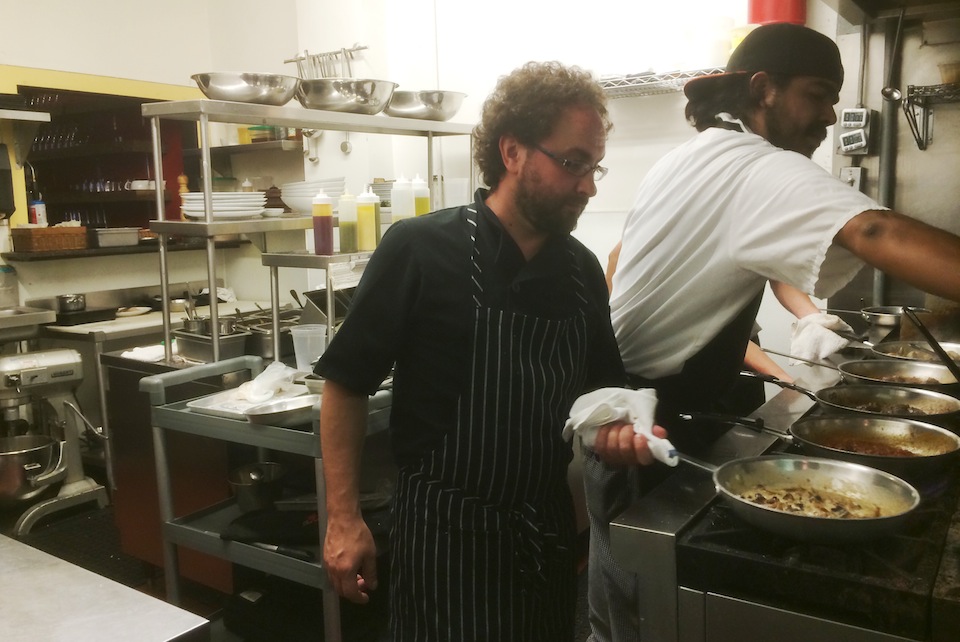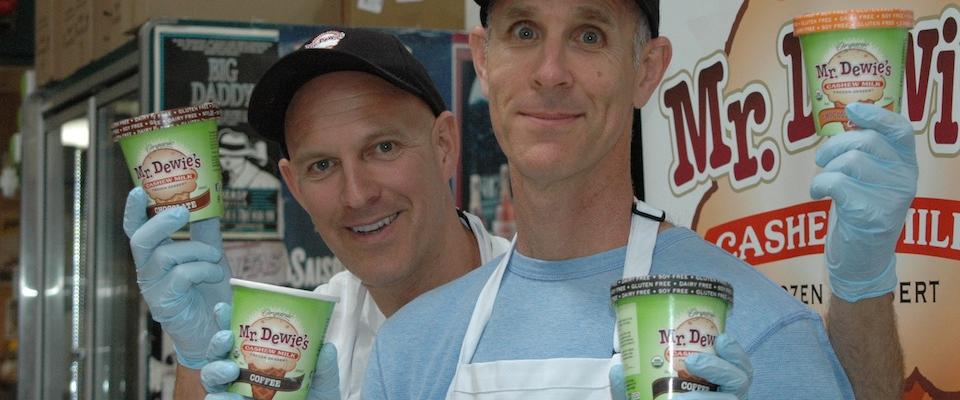Paul Oprescu majored in modern American history at UC Berkeley and planned to become an academic. But he had a dream—not the kind you hold in your heart, the kind you have in your sleep. He dreamt he was making fresh pasta and selling it to students.
That, he says, was the impetus that prompted a career change: Now he owns and operates an Italian restaurant on Shattuck Avenue.
His story is not dissimilar from many Berkeley grads who ditched other careers and veered in completely different directions from their college majors to go into the culinary arts. Most were drawn to food professions simply because of their love of cooking, eating and entertaining—who doesn’t want to turn their hobby into a successful vocation? Ultimately, for them, feeding America seemed infinitely more creative and fulfilling.
And in some cases wildly more profitable.
Do Cal alums John Scharffenberger or Alice Waters ring a bell? To any card-carrying foodie they ought to. Scharffenberger, operator of other gourmet companies (Hodo Soy Beanery, Scharffenberger sparkling wine), co-founded Scharffen Berger, the Berkeley European-style chocolate company that Hershey bought in 2005 for more than $46.6 million.
Waters, the Chez Panisse restaurateur and best-selling cookbook author, is of course credited with starting the modern farm-to-table movement that has swept the nation.
Then there’s Charles Phan, of Slanted Door fame (it’s Bill Clinton’s restaurant of choice when he comes to San Francisco), and Bill Harlan, of Napa Valley’s Harlan Estate, one of California’s premiere cult wineries. And the list goes on.
Oprescu’s Belli Osteria is casual, catering to locals and students. It doesn’t have a lot of prestigious restaurant reviews hanging on the wall—not because the food isn’t good, but not that many people know about it. He opened the place in 2012, after quitting his job teaching third graders at a Berkeley Montessori school. By then he already had received his master’s degree in sociology and philosophy at the University of Chicago. But after returning to Berkeley, he got caught up in the area’s food culture, which naturally included planting a vegetable garden in his backyard, curing meats in his cellar and cooking elaborate meals for friends. In those days he used to dumpster dive for the Acme Bread Company’s castoffs.
“The dumpsters were clean,” he quickly injects. “They were just for bread.”
But one day he rode over to the baking company and found the gates locked.
“It was a big shock,” he said, but the revelation that there would be no more free bread forced him to bake his own.

Chef Paul Oprescu at Belli Osteria
About that time, a friend gave him a pasta maker and Oprescu started making noodles from scratch, too. “Fresh pasta is magical– a blank canvas,” he says.
And that’s when the dream happened. “I know, it sounds cheesy,” he acknowledges, but it made him contemplate the idea of cooking professionally. Such an undertaking is nothing like holding a dinner party, so Oprescu says he had to think long and hard about the change. “It takes a huge level of naiveté and foolishness to think that opening a restaurant is anything like cooking at home.”
While he had no illusions that opening a restaurant was a no-risk venture, his humanities degrees, it turned out, was even less practical. “I got so much love from my students as a teacher,” he says. “Too much love, but not enough money.”
So far, the restaurant has him coming out ahead. But he cites as more important the sublime feeling he gets cooking for a dining room full of strangers.
Ari Cohen left Cal 24 years ago armed with a master’s in social welfare. For 15 years he worked as a psychiatric social worker for Alameda County. Now he makes non-dairy ice cream.
The latter is less emotionally taxing, although it’s not completely without stressors.
Cohen says that by 2006 he had had enough of social work and walked away from a life-long career to reevaluate his options and take care of lingering health problems. His malady wasn’t anything he could specifically put his finger on, but he was feeling sluggish, “like my body wasn’t right.”
Cohen began working with a nutritionist who put him on a dairy-free, gluten-free and soy-free diet. Although he felt much better, giving up milk over hot cereal made it difficult to stick to the diet. Instead of cheating, Cohen looked for an alternative to cow’s milk and when he wasn’t happy with what he found on supermarket shelves, started making his own. His best invention, done with a home blender, was pecan-date milk. It was so good, he says, that friends urged him to market his new creation.
Since he was at loose ends and needed a job, Cohen took their advice and began to scheme. His first plan was to bottle and sell the pecan-date milk at farmers’ markets. But without preservatives or stabilizers, the milk had no shelf life, and because he wanted to keep the product all-natural, he had to nix that idea. Freezing the milk, however, would preserve it for up to a year.
With no background in product development, Cohen began experimenting in his kitchen with making frozen desserts out of nut milks. He researched, played around with recipes and spent a lot of time tasting. It was more trial by error than science.
“Not only didn’t I have experience in product development, but I had no chemistry background nor any food history,” he says, joking that maybe he came by it naturally because his mother was an excellent baker. “What I did know was that a lot of the alternative ice creams on the market weren’t that good.”
His brother, a former San Francisco police officer who was also lactose intolerant, wanted in on the chance to become the non-dairy version of Ben & Jerry’s. So they pooled their resources—less than $20,000—and for the next year and a half played with prototypes. They named their company Mr. Dewie’s after a fictional character Ari Cohen once played in a music video they had made.
As the men got closer to perfecting their product, they contacted Artisana Organic Foods in Oakland to learn how they could better puree their nuts, specifically what equipment they should buy. Instead, they wound up leaving the company with 45 pounds of almond paste to play around with and an ideal partnership.
Artisana’s parent company, Premiere Organics, was looking to expand into the frozen dessert category and thought Mr. Dewie’s might just be the ticket. Soon, the Cohens moved out of the kitchen and into a shiny production plant in Oakland. Whole Foods Market eventually came calling and now carries Mr. Dewie’s line of frozen desserts in its Pacific Northwest stores. Cohen says the immediate plan is to gain a foothold in the alternative ice cream market from Seattle to San Diego. And later—the world.
“The vegan community has totally embraced us,” he says.
So far the frozen dessert business has yet to be as lucrative as social work, he admits, but says in many ways it is more gratifying. “Part of the reason I left that profession is because I felt so impotent,” he says. “There are very few resources and it’s inherently frustrating.” At least with frozen desserts, “We’re feeding a segment of consumers who can’t eat regular ice cream and don’t have a lot of choices. It’s pretty exciting to create something that’s so in demand.”
Terri Wu knows that feeling well. The Farallon executive pastry chef left Berkeley in 1993 with a degree in art history and the hope of working in a museum’s restoration department. She tried that route for a stint, eventually started a bike messenger company, but ultimately found her calling making pastry.

“The museum environment just wasn’t for me,” says Wu, who after graduation worked at the Asian Art Museum of San Francisco.
The messenger company lasted six years before it outgrew Wu and her former boyfriend. They decided to sell, leaving her to contemplate her future.
“I was trying to decide what direction I wanted to go next,” she recalls, noting that she had always been fond of cooking and entertaining friends and family. “A friend observed that professional cooking might be an option. But I didn’t know if liking to cook for 15 people would be the same as liking to cook for 400 people.”
Her friend knew the chef at Farallon and got Wu a job working on the cooking line. After a year, she was ready to take the next step: attending the California Culinary Academy. All the while she continued working at the restaurant, sticking with the savory side. But her sweet tooth kept pulling her over to the pastry part of the kitchen to mooch snacks.
Desserts were her passion, so the restaurant’s acclaimed pastry chef, Emily Luchetti, found Wu a spot making sweets. Recently, when Luchetti left, Wu got promoted to the top pastry job.
“I don’t know of any other career that is this gratifying,” she says. “To know that you’re helping people celebrate their biggest moments, creating an experience that they will never forget…well, there’s nothing quite like it.”
Kate and Casey McEachern’s Cupkates, two cupcake food trucks that travel around the Bay Area peddling Kate’s creations, was born out of frustration and cutting-edge thinking.
Kate McEachern left Berkeley in 2005 with an English degree and a secret yearning to bake. Right after graduation she talked her way into Chez Panisse, where she says she earned the distinction of being the worst intern ever.
“I stood in a closet-like room hulling hundreds of strawberries, nine hours a day,” she says. “I was very clumsy and very messy.”
The experience temporarily put her culinary aspirations on hold, and she took her English degree to a fancy editing position at Dwell magazine. But her passion for baking continued to needle her, and led her to a job managing editorial content at ChefsBest, a web site and an organization that ranks food brands. She hoped it would satisfy her yen. It didn’t.
“It wasn’t enough to feed my culinary interests,” she says. “I wanted to strike out on my own.”
But when she put a business plan together, there was no way she could make the numbers work with a brick and mortar bakery. Her not-yet-husband, Casey McEachern, who was at Berkeley working on his Ph.D. in American history, suggested a food truck.
“She looked at me like it was the dumbest thing ever,” he says.
This was 2009, before the explosion of the food-truck phenomena. But ultimately, the truck seemed like the only viable way to make the business work. The couple took their eight years of savings for a house, about $75,000, and plunked it into their new bake-shop-on-wheels. Kate estimated they had 45 days to make a profit, or they’d go broke.
In the beginning, she baked in the wee hours of the morning, loaded up the truck and parked it near the Berkeley campus. Customers came to the window asking to buy tacos, even though the truck clearly said, “Cupkates.”
Soon, however, she would pull up to her usual spot and find a line around the block. She’d sell out in 20 minutes and then get nasty emails from people who had driven from Oakland and Emeryville only to discover there were no more cupcakes. The good news: she made her 45-day profit goal. The bad news: with the overload of work, Kate couldn’t foresee taking a day off for years.
Casey came to the rescue, leaving school (supposedly for a year, but he has yet to finish his Ph.D.) to help full time. By then, food trucks had become all the rage and the couple had to work double-time to keep up, including camping for three nights on a dirty street in San Francisco to be one of the few vendors to qualify for a highly coveted permit to sell in the city. They got a second truck and hired five employees to keep up with demand—parties, weddings and corporate events.
“We knew we were riding the cusp of a trend,” Casey says. “But the raw critical thinking we learned at Berkeley has made us better suited to run a business. And we really like working together.”
The plan is to someday open a small brick and mortar shop, but for now the trucks are working fine. The couple have made enough money to pay back their house fund, and in 2011, bought a home in Berkeley.
Unlike the rest, Charlie Hallowell, owner of three acclaimed Oakland restaurants, was well on his way to making a name for himself in the food world before even enrolling in college. It was 1995 and the then 21 year old was working at Chez Panisse, trying to support his baby son, when he managed to gain admission into Berkeley’s English literature department. That in itself is something of a mystery, since his high school GPA was 1.8 and he had impossibly low SAT scores. But Hallowell was nothing if not determined.
At first, when he met with an admissions counselor at UC Berkeley, she told him there was no way he’d get into the university.
“That was just f—— bull—-,” says Hallowell.
Every month for the next year he met with her, each time turning in an essay to show his mettle. And one day, she tapped a few keys on her computer and voila, just like that he was in, Hallowell says. In return, he graduated with honors in 2001 and says he was asked to apply to the school’s Ph.D. program. Hallowell claims that at grading time he might have had an unfair advantage over other students, since he often cooked for his professors.
But having the degree was pretty great. The only problem was, he was still making $15 an hour at Chez Panisse and worrying about how he was going to earn a decent living. He thought about the PhD. program and law school. But the idea of being a restaurateur appealed more.
So Hallowell drafted a business plan to open what was to become Pizzaiolo and gave himself a six-month deadline to raise $500,000. If not, he told himself he’d go to law school. He got the investors, opened his restaurant and then subsequently opened two more—Boot and Shoe Service and Penrose.
Business, he says, has been good.
“But I only have five to 10 years max left in me for the restaurants,” says the 40 year old, adding that cooking and running three restaurants is a young man’s game. “I’m having a bit of an identity crisis. I have to have a good plan for the second half of my life.”
That plan, says Hallowell, may just include Berkeley’s English literature Ph.D. program. If they’ll still have him.




















